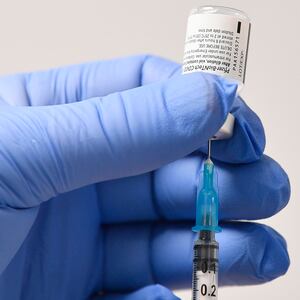MIAMI—On Tuesday evening, a trio of young women approached the back gate of Lagniappe, a tree-lined, outdoor patio wine bar near Wynwood, a trendy neighborhood of Miami that has served as Florida’s COVID-19 epicenter since the pandemic washed over the state. From the sidewalk, it was easy to see the popular drinking spot was full. Nearly all of Lagniappe’s circular patio tables were packed with maskless people sharing bottles of pinot grigio, rose, and merlot.
On Monday, the U.S. Centers for Disease Control reported that 92 out of 293 known U.S. cases of the B.1.1.7 variant, or the “U.K. variant,” a potentially more contagious strain of the coronavirus, were found in Florida. For comparison, California, which has nearly double the population, had identified 90 cases of the same variant. As the Miami Herald reported Wednesday, the U.K. variant had been identified in 19 Florida counties, but the highest incidence of known cases was in Miami-Dade and neighboring Broward. Researchers with Miami’s Jackson Health Systems have also begun analyzing positive samples for the P1 strain of the coronavirus, known as the Brazilian variant, given that Miami International Airport has two daily direct flights from Brazil, according to the paper.
Yet 25-year-old Amy Baez and her two pals at the bar didn’t seem fazed.
“I just don’t think COVID should keep me from enjoying myself and going out,” Baez said. “I definitely don’t want to catch it. But I only see a small circle of friends, we all wear masks, and meet up in places that have outdoor seating.”
Baez was unaware of the emergence of the U.K. variant, which experts believe to be more transmissible and possibly even deadlier than its predecessors, but insisted she was not worried. “It would only bother me if I caught it, didn’t show symptoms, and then gave it to my parents,” she said. “But I try not to see them in person and if I do, we wear masks and sit in the backyard.
“I do hope they can get the vaccine soon, though.”
The bar scene here is emblematic of why efforts to curb the spread of COVID-19 in Florida keep failing, infectious disease experts say. Gov. Ron DeSantis’ cowboy approach of refusing to enact a statewide mask mandate, blocking local jurisdictions from enforcing COVID-19 rules with monetary fines, and insisting on a libertarian pandemic philosophy has turned Florida into a coronavirus petri dish.
And as DeSantis wages a high-profile messaging war over the vaccine with the new administration in Washington, suggesting shots are the sole solution to the state’s pandemic ills, millions of people are at high risk with no inoculation in sight.
“We have to assume the vast majority of the state population is susceptible to COVID-19, and having a variant that is more transmissible is a significant concern,” Mary Jo Trepka, a Florida International University infectious disease expert, told The Daily Beast. “People should double down on their efforts to put on masks when they see people they don’t live with, avoiding large gatherings, and all the other precautionary measures.”
While Florida avoided a significant surge over the holidays, the U.K. variant is spreading “quite quickly” and poses a serious new risk, agreed Jill Roberts, a University of South Florida infectious disease professor. “A higher number of infected means more hospitalizations, possibly more deaths, and of course a greater burden on the health-care system,” she said.
Thanks to lax pandemic restrictions across the state, the local party scene was not confined to outdoor venues. In Miami-Dade, restaurants and bars are allowed to operate at at least 50 percent capacity indoors and 100 percent outdoors, with minimal restrictions and no viable means of enforcing rules on mask wearing.
Across the MacArthur Causeway, half-a-dozen sun-tanned booze hoods huddled at the wood bar of Ted’s Hideaway, a dive joint in Miami Beach. A Ted’s regular, Jessica Riveron, stood underneath a purple neon sign near the entrance. The 25-year-old told The Daily Beast she enjoyed Ted’s chill vibe, but that she was always vigilant, pulling a mask from her back pocket and putting it on.
“I feel safe here because it’s not super crowded, and it’s a cool spot,” Riveron said. “People are friendly and I can play pool.”
Riveron said she’d read and heard about the new strains, but was prepared to live her life to the fullest as she looked ahead to inoculation. “Look, we have to protect ourselves regardless,” she said. “The virus is everywhere and we can’t see it. I’m not afraid of getting the vaccine when it’s available for people like me.
Still, Trepka warned that the development of vaccines to thwart the deadly respiratory disease that has killed more than 400,000 people in the U.S. has lulled people into a false sense of security.
“People now think that because we have a vaccine, we have control of the situation,” she said. “That is not the case.”
As of midnight Wednesday, over 1.6 million Floridians had received at least one shot, representing 6.8 percent of the state’s total population.
The problem is that the Sunshine State, which has recorded nearly 1.7 million total coronavirus cases to date, has played host to a remarkably messy vaccine rollout. Since Gov. Ron DeSantis declared people 65 and over would get the vaccine after frontline health-care workers—and before essential ones like those at grocery stores—senior citizens across the state’s 67 counties have experienced systemic problems trying to get doses. A spokesperson for the governor’s office did not respond to requests for comment.
For instance, last week, a vaccination site set up in The Villages, Florida’s largest retirement community whose residents are predominantly Republican voters, was abruptly shut down. Global Medical Response, the company running the drive-through operation, notified residents it didn’t have enough vaccines. In an email sent to Villages residents who signed up for doses, Global Medical Response said “all 7,500 scheduled appointments for first doses have been placed on hold until we receive adequate supply of vaccine.”
William Anderson, a 66-year-old homeowner in The Villages who shared the email with The Daily Beast, was despondent. “I want to see my grandchild,” he said.
Partisan politics also threatens to grind down the vaccine rollout. On Monday, DeSantis complained that President Joe Biden, who has only been in office one week, needed to ramp up vaccine distribution in Florida and other states. “I think the only thing they need to be focusing on is increasing the supply of these doses for our seniors,” DeSantis said at a press conference in Jacksonville.
Later that afternoon, White House press secretary Jenn Psaki told reporters that Florida had only distributed half of the nearly 3 million vaccines the state has received so far. “They have a good deal of vaccine,” she said. The following day, DeSantis fired back with a statement posted on Twitter. The first line reads, “The insinuation that Florida is underutilizing vaccines is totally disingenuous.”
It is true that Florida’s vaccine rollout woes echo national distribution problems, and it is not faring as poorly as some states in getting shots in arms. But prominent state epidemiologists told The Daily Beast now would be the worst time for the governor, a diehard ally of former President Donald Trump, to pick a fight with the new president.
And focusing on shot distribution over other pandemic safety measures was counter-productive, they added.
“Politics made a mess of our pandemic response,” said Marissa Levine, a University of South Florida infectious disease professor. “We don’t need any more political divisions at this time.”
Levine also noted it is going to take some time for the vaccine rollout to work seamlessly. “We know setting up a vaccine distribution process is going to be rocky,” Levine said. “That is what we should be focusing our efforts on and not spending time pointing fingers. That is just a waste of energy.”
For his part, Anderson, the Villages resident, got a call Wednesday morning from the Sumter County Health Department to reschedule his lost appointment. He expressed hope that he would get his shots in time to ward off the new variants—which experts are cautiously optimistic vaccines will guard against.
But he was also racked by anxiety about the intervening period, one that had many of his fellow citizens in serious danger.
“I just gotta be extra careful, I guess,” Anderson said. “And hopefully my Friday appointment doesn’t get canceled.”








